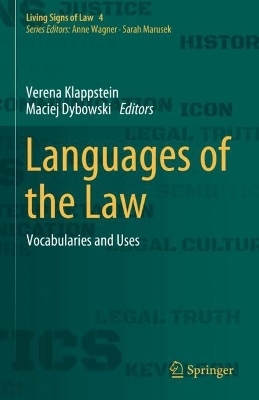
Languages of the Law
Springer International Publishing (Verlag)
978-3-031-72922-5 (ISBN)
- Noch nicht erschienen - erscheint am 10.01.2025
- Versandkostenfrei innerhalb Deutschlands
- Auch auf Rechnung
- Verfügbarkeit in der Filiale vor Ort prüfen
- Artikel merken
Law can be seen as a motley of different languages deployed in the legal domain. The authors of the chapters share interest in what determines the scope of the vocabulary of these languages as well as in the way they are used. Thus, both the linguistic and pragmatic turns occurring in the philosophy of language are explored as exercising not mere ripple effects on legal scholarship, but rather as having a huge impact on jurisprudence.
The chapters in this volume tackle three broad problem areas to offer a coherent picture of languages of the law. The first section is devoted to legal language at large, including reflections on its nature and some distinct functions it performs in the legal domain. The second section of the book focuses on the distinctly legal and pragmatic dimensions of some fragments of vocabulary, used either in legal texts or in legal scholarship. In the third section of the volume, authors research specific questions regarding legal language and legal reasoning.
Dr. iur. Verena Klappstein M.A., LL.M. currently works at the Institute for German and European Private Law, Civil Procedure Law and Legal Theory, professorship of Prof. Dr. Thomas Riehm, Universität Passau. Verena does research in Civil Law, Company Law and Legal Fundaments. Besides working on her Habilitation, current projects are on (Legal) Reasoning and procedural law.
Dr Maciej Dybowski is an assistant professor in the Department of Legal Theory and Philosophy at Adam Mickiewicz University where he completed his master's degree in law and Ph.D. He also holds master's degree in philosophy from the Jagiellonian University in Kraków. Maciej's research interests include philosophy of law, axiology, philosophical anthropology and philosophy of language. More specifically, his work focuses on analytic pragmatism in legal philosophy, practical reasoning and philosophy of human rights.
Languages of the Law: Vocabularies and Uses. Introduction.- Part I. Legal Language, Signs & Speech Acts.- Language of the Law as a Sign and as a Symbol.- Listing Acts of Legal Communication: An Extension of the Concept of Legal Language.- On Pineapple Wine: Compound Terms and the Ordinary Language(s) of the Law .- Street Naming, Speech Acts and the Law.- Part II. Conceptualisation of Law via Language.- Law and (Conceptual) Revolution.- The Normativity of Law and Normative Vocabularies in Law: The Inferentialist Explanatory Route.- What Can Content-Force Distinction Teach Us About Law?.- Union is strength. Textual agency of constitutions in the integration of democratic communities.- Part III. Legal Reasoning.- Application and Applicability of the Law in Relation to its Validity.- The Application of Juristic Concepts in Legal Reasoning.- Stranger than legal fictions - the argument of analogy.- , "Legal practice" as a part of the Court of Justice of the European Union's vocabulary.
| Erscheint lt. Verlag | 10.1.2025 |
|---|---|
| Reihe/Serie | Living Signs of Law |
| Zusatzinfo | X, 270 p. |
| Verlagsort | Cham |
| Sprache | englisch |
| Maße | 155 x 235 mm |
| Themenwelt | Geisteswissenschaften ► Philosophie ► Sprachphilosophie |
| Recht / Steuern ► Allgemeines / Lexika | |
| Recht / Steuern ► EU / Internationales Recht | |
| Schlagworte | Language of Law • lawmakers • Legal language • Legal philosophy • Linguistic turn • Philosophy of Language • theory of science |
| ISBN-10 | 3-031-72922-6 / 3031729226 |
| ISBN-13 | 978-3-031-72922-5 / 9783031729225 |
| Zustand | Neuware |
| Haben Sie eine Frage zum Produkt? |
aus dem Bereich


